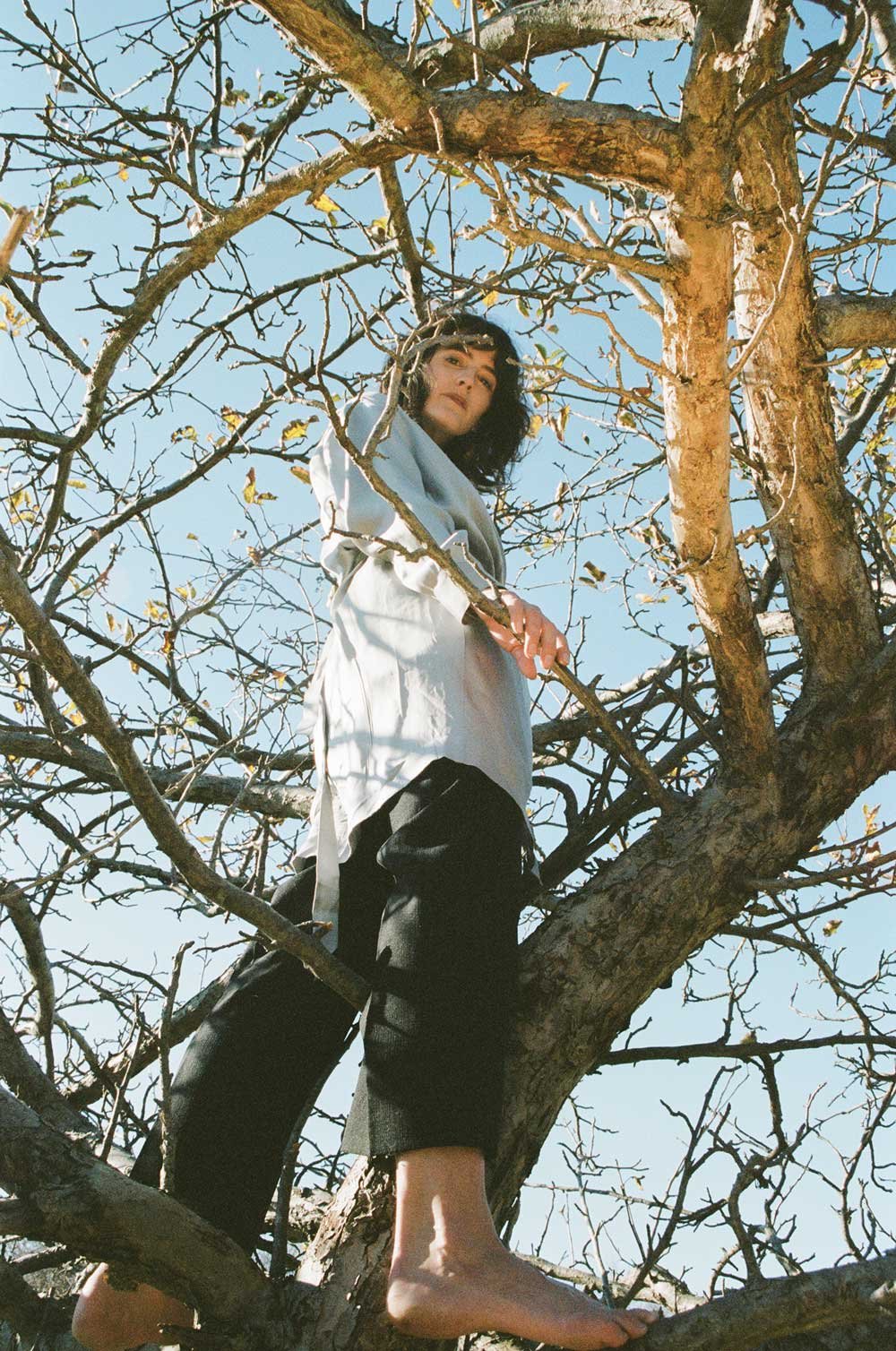WATCH / SHARE “LAVENDER CITY” LYRIC VIDEO
BUY / STREAM “LAVENDER CITY” HERE
THESE ARE THE SOUNDS LEFT FROM LEAVING SET FOR RELEASE MAY 13, 2022 VIA OUTSIDE MUSIC
PRE-SAVE THESE ARE THE SOUNDS LEFT FROM LEAVING HERE
Photo Credit : Rima Sater // DOWNLOAD HIGH-RES
On the new single, “Lavender City”, from her upcoming album, These Are The Sounds Left From Leaving, Jenny Berkel examines the existence and effect of lies in a more intimate setting. With its crescendo-ing strings (Colin Nealis), insistent percussion–pushed forward primarily by the vibraphone–and harmonies (Kacy Anderson of Kacy & Clayton), “Lavender City” is a breakup song about the moment the discrepancy between who somebody says they are and who somebody shows themselves to be becomes too great to ignore.
"Everything on this album is tinged with the madness of how language and information is being used in a post-Trump, heavily gaslit world where our perceptions of reality have become distorted,” says Berkel. "Lavender City" is a “more intimate look at lies–it’s a breakup song about gaining the capacity to see more clearly again. But it’s also about looking beneath the lies to see what’s inside.”
WATCH / SHARE “LAVENDER CITY” LYRIC VIDEO
BUY / STREAM “LAVENDER CITY” HERE
MORE ABOUT THESE ARE THE SOUNDS LEFT FROM LEAVING
“I wrote the album in a tiny apartment, at a time when everything felt big and overwhelming,” says poet and songwriter Jenny Berkel about her new album, These Are the Sounds Left from Leaving. She was living in a brownstone walk-up full of radiant light and the ever-present soundscape of a leaky bath faucet. It was a sudden move at the time — a spontaneous departure from touring, bustling city life, being many things to many people — that landed Jenny in a space of self-imposed stillness.
“I grew up in the countryside next to a ravine and forest, so big cities have always felt overstimulating and overwhelming. After a year of busy touring around Canada and Europe, during which Toronto was my home base, I came home and just felt so tired. My anxiety—which for me tends to feel like a non-stop, high-pitched radio frequency in my head—felt worse than ever. I wasn’t functioning the way I needed or wanted to, and Toronto offered little respite for me. Without a rest and a change of pace, it felt like I was going to disappear from myself, so shortly before the new year, I moved into a tiny apartment in a much smaller place.
It was in this apartment, during this withdrawal, that I began working on this record. Outside, the world was swirling with information and disinformation, news about physical, political, and emotional violence, and urgent climate warnings; meanwhile, I was inside being quiet, trying to see clearly both what was outside and within. That winter, it snowed over and over again, amplifying the quiet, and I had a neighbour upstairs who hated any noise, so my quiet was even more compounded by that. In the midst of all of this, I also started studying poetry more seriously, which deepened my sense of the sonic qualities of language and poetic detail. I remember going back and forth between poems and songs, feeling their similarities and differences. Songs felt very clearly like the place to put these big exterior and interior anxieties. I needed to fully feel them, and there is nothing like music moving through your body and resonating within to make you really feel. Songs can pull everything out of your heart, and they can put everything in too. I followed the sounds and shapes and feelings of all of those anxieties, contextualized them with the details of everyday life, and wrote it all into this album.”
The songs on the album themselves are “a study of proximity, bringing big fears into small spaces,” says Berkel. “They’re intimate examinations of a world that often overwhelms.” Each song is set in the micro-world of a keen feeling observer, trying to parse a mindful moment in a setting where it feels impossible to drop a truth anchor—a post-Trump, heavily gaslit world where perceptions of reality remain distorted.
WATCH / SHARE “YOU THINK YOU’RE LIKE THE RAIN” HERE
BUY / STREAM “YOU THINK YOU’RE LIKE THE RAIN” HERE
The album sees Jenny taking on a producer's role, co-producing alongside Dan Edmonds and Ryan Boldt (The Deep Dark Woods) with string arrangements by Colin Nealis (Andy Shauf). The album’s first single, “You Think You’re Like The Rain”, also sees contributions from the critically acclaimed folk duo Clayton Linthicum and Kacy Anderson (Kacy & Clayton).
“Kaleidoscope”, is a dissonant and poetic consideration of the importance of care and precision in language, both in the broader political landscape and in intimate emotional ways. From the heart-wrenching confusion of interpersonal manipulation, it extrapolates a collectively felt disorientation at the kaleidoscopic swirling of disinformation and misinformation. “Lavender City” is a more intimate look at lies. A breakup song with crescendo-ing strings, insistent percussion, and hopeful harmonies, it’s about gaining the capacity to see clearly again – but with the painful entailment of anatomizing the lies that drew you in. Looking beneath them to see what’s inside.
Songs like “July” and “Just Like A River” embody a similar dichotomy but feel more like mellow meditations; they are recreations of moments where small, specific reveries gave way to more sprawling contemplation–but in an appreciably peaceful and illuminative way. “July started as a tiny chorus written for somebody I thought I could maybe love someday,” Jenny says with a smile, in a conversation about the seeds of the album’s singles. “It was a hot summer, one that reminded me of being a small child in the middle of July in southwestern Ontario. It’s a love song, but it’s also a nostalgic song that expresses how memory shifts and shapes you, and how the stories we tell become who we are.”
WATCH / SHARE “KALEIDOSCOPE” HERE
BUY / STREAM “KALEIDOSCOPE” HERE
“I wanted the songs to feel like living creations that capture a living moment,” says Jenny about envisioning the recording process. “I wanted that theme of big fears in small spaces to be heard and felt as a coexistence of intimacy and menacing permeability.” Recorded live off the floor at the Sugar Shack with engineer Simon Larochette, the album sparkles with its intended intricacies. Musically, it feels both close and expansive. Each song unfolds like a widening web of poetic associations, narrated by nostalgic piano, pondering strings, glittering guitars—and Jenny’s hauntingly immersive vocals. At times, songs end with an unravelling, the music splintering apart into disintegration like a lingering open question. Warm and dark, soft with stabs of madness, These Are The Sounds Left From Leaving is a cohesive collection of spare songs that bloom lushly with detail.
Whether you’re reading Jenny’s poetry—in her debut chapbook Grease Dogs with Baseline Press — or listening to her songs, you’ll experience her drawing layers of far-reaching concern into particular moments, like concentric waves rippling inward toward a lone cast stone. These Are The Sounds Left From Leaving showcases the perspective of a unique storytelling artist, with an evocative practice that hinges powerful narratives on the intricacies of a multifaceted musicality. A songwriter immersed in poetry, a poet immersed in music—her work in all its forms is an invitation into a world of relatable introspection, in which even absences can be sculpted into vividly memorable verse.
PRE-SAVE THESE ARE THE SOUNDS LEFT FROM LEAVING HERE
DOWNLOAD HIGH-RES
THESE ARE THE SOUNDS LEFT FROM LEAVING
01 Just Like A River
02 Kaleidoscope
03 Watch You Fade
04 July
05 Lavender City
06 Under A Sky
07 You Think You’re Like The Rain
08 Invisible You
09 Song Of Yourself
10 Here Comes The Morning


